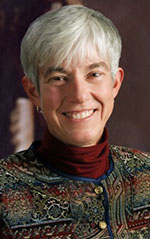Betty Friedan in Budapest
Reflections
BY BEATRICE CAMP
The opportunity to host feminist icon Betty Friedan in Budapest was one I couldn’t pass up, even when a colleague from the U.S. Information Agency speaker’s bureau called to warn me that “she’s very difficult.”
By 1998 Betty Friedan was in her late 70s, her seminal book The Feminine Mystique written 45 years earlier. It wasn’t a given that young people would recognize her name, especially those born behind the Iron Curtain. But her history of human rights activism and writing fit well with our programs in the areas of human rights and training for Roma journalists.
My enthusiasm wavered as our one-day speaker program at the Central European University’s Center for Independent Journalism turned into four days of exasperating hand-holding. It was all too obvious from her first step on Hungarian soil that Betty Friedan was indeed difficult. To quote her own memoir: “The truth is that I’ve always been a bad-tempered bitch.”
In addition to living up to her reputation as an abrasive and egocentric iconoclast, Friedan’s surprising frailty meant she needed to be helped with the smallest tasks and escorted everywhere. Sometimes this was fun. I did enjoy discovering, when she needed help accessing a Hungarian ATM, that her passcode related to 19thcentury suffragette Susan B. Anthony.
My attempt to brief her on the speaking engagements was derailed by her insistence on visiting the town where her mother’s family originated. She was very interested in her Jewish roots, repeatedly asking about a town in Czechoslovakia, a country that no longer existed, although we couldn’t convince her of that.
Even though her version of the town’s name was indecipherable, we figured out it must be Sátoraljaújhely, on the Hungarian- Slovak border. It helped that we were aware that Estée Lauder’s family hailed from that town, even if it was startling to think that the makeup mogul and the rabble-rouser were practically kin.
It turned out all she needed was an audience, and her famous feistiness took hold.
Friedan’s other demand was easier to accommodate. Her friend George Lang, the Hungarian-born mastermind behind New York’s Café des Artistes (closed in 2009), had directed her to eat at Gundel, the historic Budapest restaurant that he had bought and restored to old-world elegance. Friedan relayed that Lang had instructed her to try a particular menu item with apricots, although she couldn’t remember what dish specifically. Goose pâté with apricots, duck à la apricot sauce, apricot cottage cheese mousse, apricot liqueur—we tried it all.
When I arrived at the hotel on the morning of the program to take her to the Central European University, Friedan was still in her room. Sitting on her bed rifling through a bag of jewelry, she told me she (1) wasn’t going until she found matching earrings, (2) didn’t “give a shit” whether she was late, and (3) felt so “crappy” she was ready to cancel the whole thing.
Despite this unpromising start, it turned out all she needed was an audience, and her famous feistiness took hold. In seven hours that day Friedan plowed through three major speeches plus two TV, one radio and several newspaper interviews. In contrast to her sleepy confusion only days earlier, the woman who had mobilized to found the National Organization for Women and the National Women’s Political Caucus showed she still had the power to stir and inspire.
The young university students seemed especially captivated—something about this wizened grandmother describing how she got fired for being pregnant 50 years earlier resonated with them. She even made the TV news that night, speaking out against a recent Hungarian court decision restricting abortion rights.
Perhaps those students were able to share in the sentiment Friedan expressed at the conclusion of her memoir, My Life So Far : “I think how lucky I am that my life should have converged on history the way it did. The adventure of being able to use my life to transform society in a way none of us then would have ever dreamed possible is gratifying beyond measure.”


